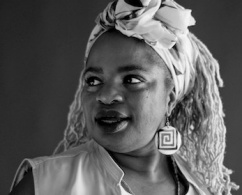James R. Johnston Chair in Black Canadian Studies 25th Anniversary Celebration
April 28, 2022
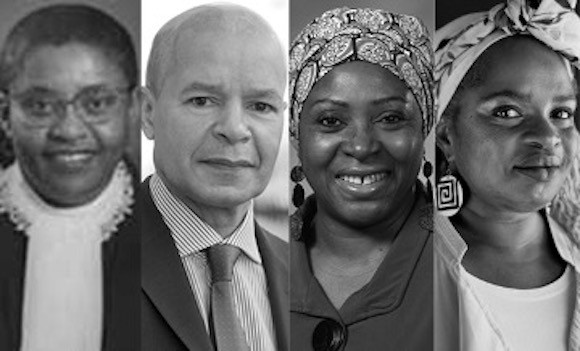
Left to right: Johnston Chairs — Esmeralda Thornhill, David Divine, Afua Cooper and OmiSoore Dryden.
Thirty years ago, Dalhousie became the first university in Canada to create a dedicated senior academic position devoted to Black Canadian Studies. Mr. Burnley ‘Rocky’ Jones — the late Halifax-based African Nova Scotian lawyer, educator, and activist, came up with the idea for the position. The position was made possible with the help of Dalhousie’s president at the time, Dr. Howard Clark, and professor Dr. Fred Wien who helped Mr. Jones engage the federal government and the African Nova Scotian community. They decided to name the position after the first African Nova Scotian person to earn a degree at Dalhousie and the first Black lawyer in Nova Scotia, Mr. James Robinson Johnston. As a result, twenty-five years ago the inaugural Johnston Chair was appointed – Dr. Esmeralda Thornhill.
The unique structure of the Johnston endowed Chair has allowed chair holders to make lasting impacts in Black Canadian studies within a variety of scholarly disciplines.
The Johnston Chair has a six-year appointment, as opposed to the traditional five-year appointment of a Canadian Research Chair. This allows (and has allowed) Johnston Chair holders a generous time period to establish and advance research programs while engaging with the community through a number of unique events, including conferencing. The Johnston Chair also comes with tenure, giving the Johnston Chairs the security needed to do rewarding and yet, at times, difficult work.
Importantly, the endowed chair rotates through faculties reflecting how Black studies engages in research across fields – in other words, Black studies is not only interdisciplinary, but also transdisciplinary. The inaugural Johnston Chair holder was Prof. Esmeralda Thornhill (1996-2002) in the Faculty of Law. Prof. David Divine (2004-2009), a scholar of social work, held the Johnston Chair in the Faculty of Health Professions. Dr. Afua Cooper (2011-2017) held the Johnston Chair in the Faculty of Arts and Social Sciences, where she developed Dalhousie’s Black Studies minor, the first of its kind at a Canadian university. Dr. OmiSoore Dryden (2019-Present), the first queer person to have this position, holds the Johnston Chair in the Faculty of Medicine.
As we celebrate these milestones, it is important to review how we got here and just some of the amazing accomplishments to date.
To recognize twenty-five years of accomplishments in Black Canadian studies by four Johnston Chairs, the current Chair holder, Dr. OmiSoore Dryden, planned a series of celebratory events. The first of which was an online lecture and conversation with discussant Dr. Barbara-Ann Hamilton-Hinch and the second Johnston Chair Prof. David Divine (2004-2009), titled Talking to 'Others' from within my Authentic Self.
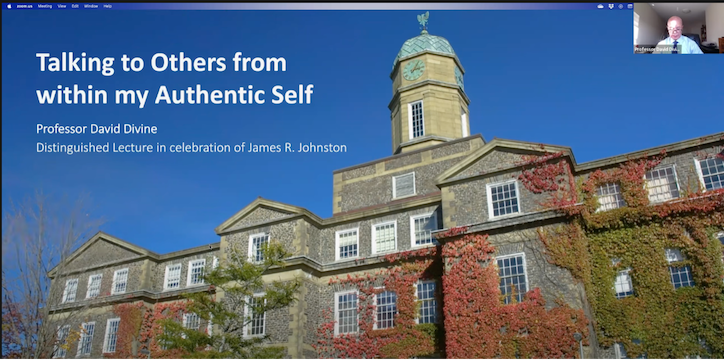
The second event was a university-wide celebration on campus. Held on Thursday, March 10th, in honour of Mr. Johnston’s Birthday (March 12), the event included senior administration, members of the broader community, and the extended Johnston family.
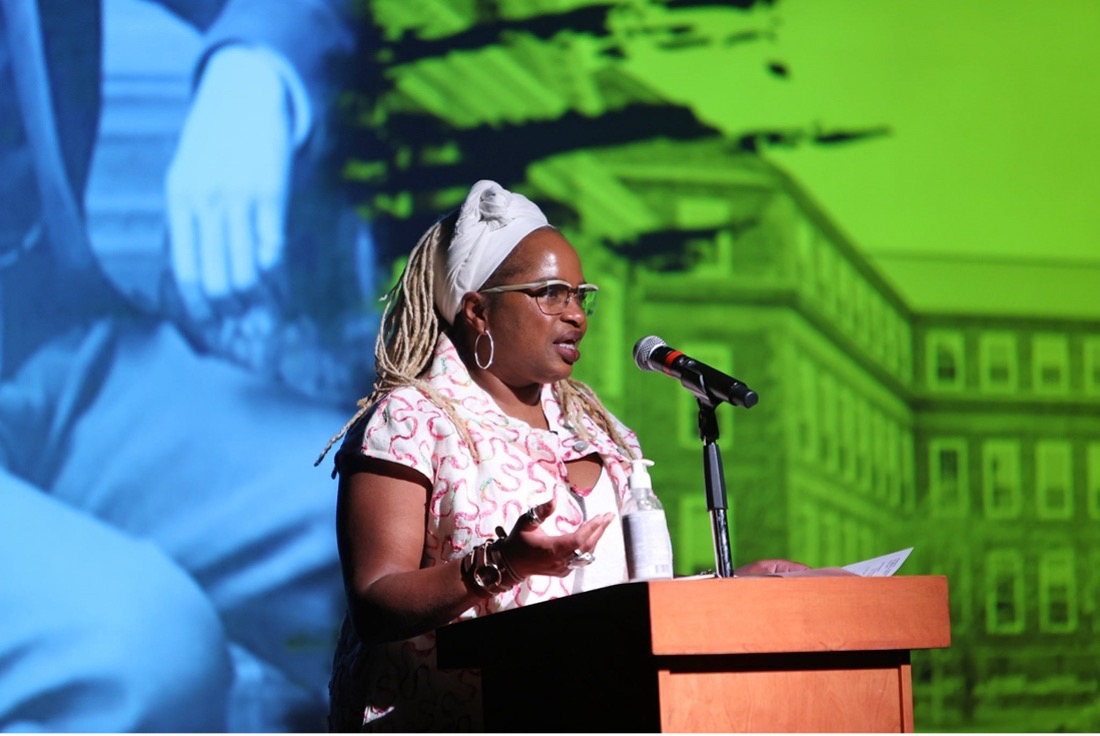
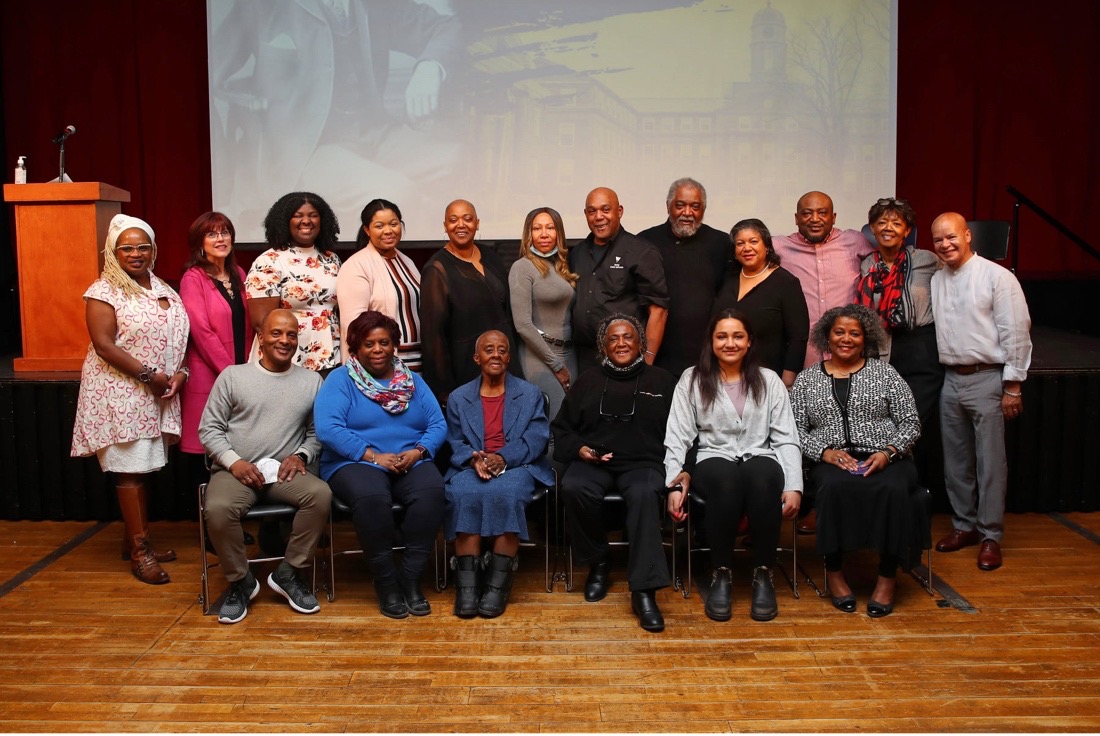 Descendants of Mr. James R. Johnston, previous Chair holder Prof. David Divine (far right), and current Chair holder Dr. OmiSoore Dryden (far left) at the 25th anniversary event.
Descendants of Mr. James R. Johnston, previous Chair holder Prof. David Divine (far right), and current Chair holder Dr. OmiSoore Dryden (far left) at the 25th anniversary event.As DalNews documented, the evening began with a drumming ceremony by Drummers from Home, who opened the space with African and world beat rhythms. The ceremony was followed by a land acknowledgement and introduction from Dr. OmiSoore Dryden, the current James R. Johnston Chair who organized and co-hosted the event with Ms. Charla Williams (in picture, beside Prof. Divine), a great-niece of Mr. James R. Johnston. Ms. Williams graduated from Dalhousie in 2007 and worked in the field of diversity, equity, and inclusion for over four decades.
Dr. Deep Saini, Dalhousie’s president, gave remarks about the origin and impact of the Johnston Chair and thanked the Johnston family for their support and contributions to Dalhousie.
Two portraits of the Johnston Chairs were unveiled during the celebration. Dr. Jure Gantar, Dean of the Faculty of Arts and Social Sciences, unveiled the portrait of Dr. Cooper, who was unfortunately unable to attend the festivities. Dr. Judy MacDonald, Director of the School of Social Work, helped unveil the portrait of Prof. Divine. Prof Divine extended his gratitude to the Johnston family for their support during his tenure as Johnston Chair and received a standing ovation for his heartfelt remarks.

A final drumming ceremony from Drummers from Home helped close the event.
Guests were given a cupcake to celebrate the 146th year of Mr. Johnston’s birth. Guests sang Happy Birthday to ‘Uncle Jimmy,’ as he was known to his family.
More details from the event can be found here:
DalNews
JRJ Chair Anniversary Event Video
Pictures from the event
Selected Scholarship by the Johnston Chairs
Dr. Esmerelda Thornhill:
Thornhill, E. (1985). Focus on Black women. Can. J. Women & L., 1, 153.
Thornhill, E. M. (2008). So seldom for us, so often against us: Blacks and law in Canada. Journal of Black Studies, 38(3), 321-337.
Prof. David Divine:
Divine, D. (Ed.). (2009). Multiple lenses: Voices from the diaspora located in Canada. Cambridge Scholars Publishing.
Divine, D. (2005). Foreword, in Johnston, J.M. James Robinson Johnston – The Life, Death and Legacy of Nova Scotia’s First Black Lawyer. Nimbus Publishing Ltd.
Dr. Afua Cooper:
Cooper, A. (2007). Acts of resistance: Black men and women engage slavery in Upper Canada, 1793-1803. Ontario History, 99(1), 5-17.
Cooper, A., & Raussert, Wilfried. (2020). Black matters. Roseway Publishing, an imprint of Fernwood Publishing.
Dr. OmiSoore Dryden:
Dryden, O., & Lenon, S. (2015). Disrupting queer inclusion: Canadian homonationalisms and the politics of belonging. UBC Press.
Dryden, O., & Nnorom, O. (2021). Time to dismantle systemic anti-Black racism in medicine in Canada. Canadian Medical Association Journal, 193(2), E55-E57.
Who Gets To Do Medicine: Black Canadian Studies and Medical Education, OmiSoore H. Dryden, TOPIA: Canadian Journal of Cultural Studies, April 21, 2022. Vol. 44:, 159-174. https://www.utpjournals.press/doi/full/10.3138/topia-2019-0051.
Coronavirus Discriminates Against Black Lives Through Surveillance, Policing and The Absence of Health Data, Beverly Bain, OmiSoore Dryden, Rinaldo Walcott, The Conversation, April 20, 2020. https://theconversation.com/coronavirus-discriminates-against-black-lives-through-surveillance-policing-and-the-absence-of-health-data-135906

